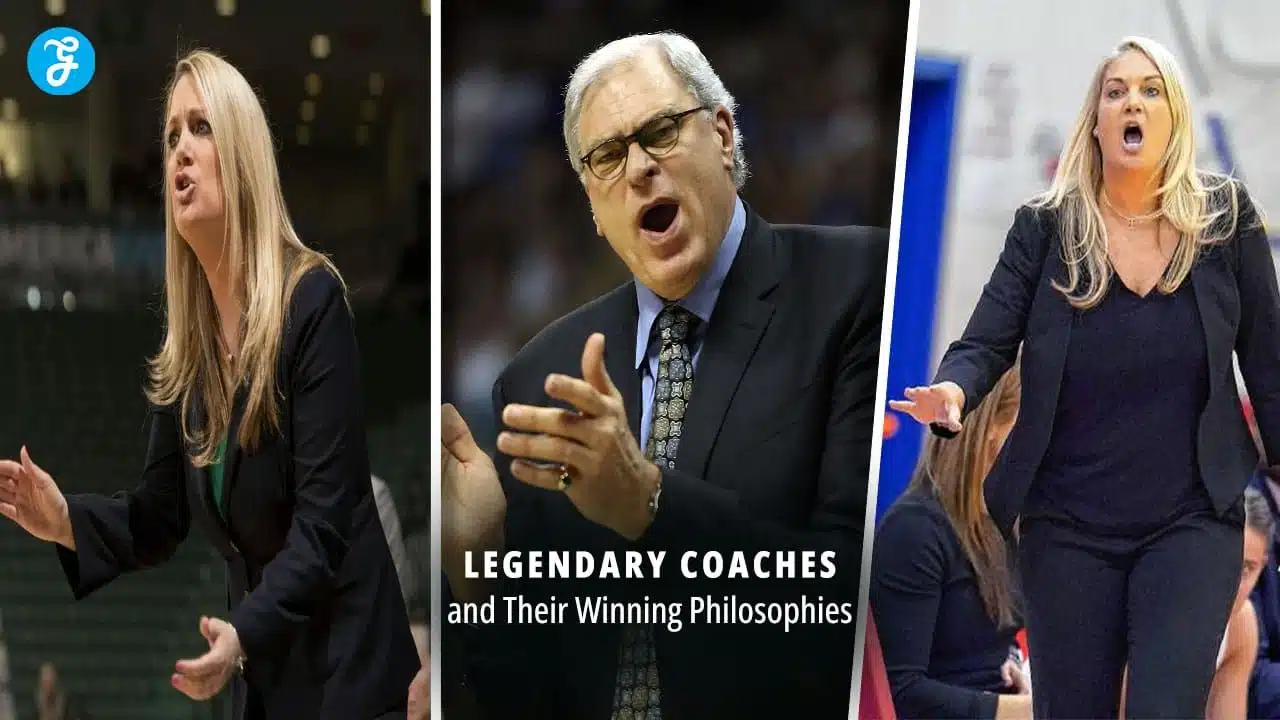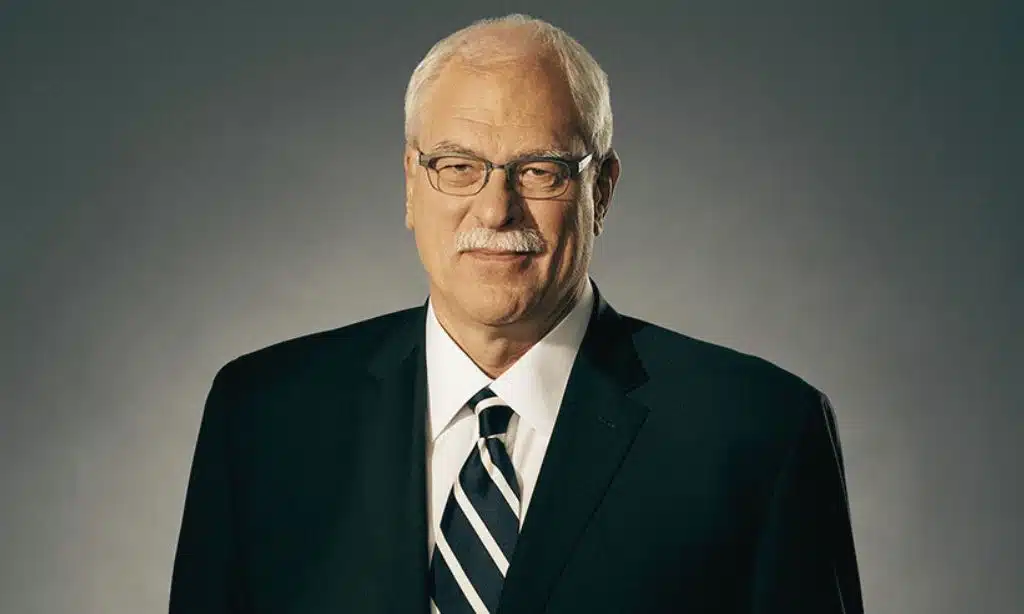Legendary coaches have left their mark on sports history. Their winning philosophies have shaped teams, players, and even entire leagues. These coaches go beyond just teaching game strategies. They inspire, motivate, and build character in their athletes.
You can learn a lot from the methods of great coaches. Their ideas apply to more than just sports. The lessons they teach can help in many areas of life.
From goal-setting to teamwork, these coaches offer wisdom beyond the field or court.
1. Phil Jackson’s ‘Triangle Offense’
Phil Jackson’s ‘Triangle Offense’ revolutionized basketball strategy. This system helped him win 11 NBA championships as a coach.
The Triangle Offense focuses on teamwork and player movement. It creates spacing on the court and gives players multiple options to score.
How does it work? Players form a triangle on one side of the court. This shape allows for quick passing and cuts to the basket.
The offense doesn’t rely on set plays. Instead, it adapts to the defense. Players read the court and make decisions based on what they see.
Jackson’s system requires smart, unselfish players. It’s not about one star scoring all the points. Everyone on the team has a chance to contribute.
The Bulls and Lakers thrived using this offense. Michael Jordan, Scottie Pippen, Kobe Bryant, and Shaquille O’Neal excelled.
Critics say the Triangle is too complex. However, Jackson’s success proves its effectiveness when used correctly.
2. Vince Lombardi’s ‘Winning Habit’
Vince Lombardi, the legendary NFL coach, believed winning was more than a goal. He saw it as a habit you could build.
Lombardi taught his players that success comes from consistent effort. He said, “Winning is not a sometime thing; it’s an all-time thing.” This means you must always try your best.
His famous quote goes: “Winning is a habit. Watch your thoughts; they become your beliefs.” Lombardi knew that what you think shapes who you are.
He pushed his team to practice hard every day. Lombardi said, “Practice does not make perfect. Only perfect practice makes perfect.” This shows how much he valued doing things right.
Lombardi’s teams won five NFL championships in seven years. This proves his ‘winning habit’ approach worked. You can use his ideas in your own life to reach your goals.
Remember, building good habits takes time. But if you stick with it like Lombardi, you can create your own success story.
3. Bill Belichick’s ‘Do Your Job’
Bill Belichick’s “Do Your Job” philosophy has become a cornerstone of his coaching style. This simple phrase carries deep meaning for the New England Patriots.
What does “Do Your Job” really mean? It’s about focus and responsibility. Every player has a specific role on the team. Your job is to excel in that role.
Belichick values dependability over raw talent. He wants players who show up consistently and perform their tasks well. This approach builds a strong team unit.
The “Do Your Job” mindset extends beyond the field. It applies to preparation, practice, and game day performance. You’re expected to give your all in every aspect of the game.
Belichick’s philosophy emphasizes team success over individual glory. When everyone does their job well, the team thrives. This approach has led to multiple Super Bowl victories.
How does this apply to you? Think about your role in your team or workplace. Are you fully committed to your responsibilities? Do you consistently give your best effort?
By embracing the “Do Your Job” mentality, you can improve your performance and contribute more effectively to your team’s success.
4. Pat Summitt’s ‘Prepare, Execute, Persist’
Pat Summitt successfully led the Tennessee Lady Vols with her “Prepare, Execute, Persist” philosophy. This approach helped her become one of the most winning coaches in college basketball history.
Summitt believed in thorough preparation. She made sure her players trained hard and knew their opponents inside out. This gave them an edge on the court.
Execution was critical in Summitt’s playbook. She taught her team to carry out game plans with precision. Every player had a role and worked together like a well-oiled machine.
Persistence was the final piece of Summitt’s strategy. She pushed her players to keep going even when things got tough. This never-give-up attitude often led to comebacks and close wins.
Summitt’s philosophy went beyond basketball. She used it to build character and prepare her players for life after college. Many of her former athletes went on to successful careers, crediting her teachings.
You can apply Summitt’s approach to your own goals. Prepare thoroughly, execute your plans well, and keep pushing forward. This winning formula can help you succeed in sports and life.
5. John Wooden’s ‘Pyramid of Success’
John Wooden, the legendary UCLA basketball coach, created a framework for success beyond sports—his ‘Pyramid of Success’ guides achieving greatness in any field.
The pyramid has 15 building blocks. At its base are qualities like perseverance, friendship, loyalty, cooperation, and enthusiasm. These form the foundation for success.
Moving up the pyramid, you’ll find self-control, alertness, initiative, and intentness. These traits help you stay focused and take action toward your goals.
Near the top are condition, skill, and team spirit. These represent the importance of being prepared, honing your abilities, and working well with others.
The peak of the pyramid includes poise and confidence. These qualities come from mastering the levels below and help you perform at your best under pressure.
Wooden believed success isn’t just about winning. It’s about giving your best effort and becoming the best version of yourself. His pyramid provides a roadmap for personal growth and achievement.
Many successful people in sports and business have used Wooden’s pyramid as a guide. You can apply these principles to improve your own life and career.
6. Alex Ferguson’s ‘Control and Command’
Alex Ferguson led Manchester United to incredible success over 27 years. His ‘Control and Command’ style was crucial to his achievements.
You can learn from Ferguson’s approach to leadership. He demanded total commitment from players and staff. Everyone had to buy into his vision for the team.
Ferguson controlled every aspect of the club. He oversaw training, tactics, and player development. His attention to detail was legendary.
You might wonder how he maintained authority for so long. Ferguson wasn’t afraid to make tough decisions. He moved on to star players when he felt it was suitable for the team.
Ferguson also built a robust youth system. This gave him control over player development from an early age. Many great players came through United’s ranks under his watch.
His command extended beyond the pitch, too. Ferguson managed the media skillfully. He protected his players and put pressure on opponents through his press conferences.
7. Tony Dungy’s ‘Quiet Strength’
Tony Dungy’s approach to coaching stands out in the world of football. His book “Quiet Strength” gives you a peek into his winning philosophy.
Dungy led the Indianapolis Colts to a Super Bowl victory in 2007. He was the first African American head coach to achieve this feat.
What sets Dungy apart is his calm demeanor. He doesn’t yell or use harsh words. Instead, he leads with quiet confidence and strong principles.
Faith plays a significant role in Dungy’s life and coaching style. He believes in respecting players and helping them grow as people, not just athletes.
Dungy’s success goes beyond wins and losses. He took his teams to the playoffs for ten years in a row. This shows the lasting impact of his leadership.
His book shares lessons on life, not just football. You’ll learn about facing challenges, building character, and staying true to your values.
Dungy’s “Quiet Strength” proves that you don’t need to be loud to be heard. His gentle yet firm approach has inspired many both on and off the field.
8. Phil Jackson’s ‘Sacred Hoops’
Phil Jackson’s book “Sacred Hoops” looks into his coaching philosophy. You’ll find a mix of basketball strategy and spiritual wisdom in its pages. Jackson blends Zen principles with basketball techniques.
The book shows how Jackson led the Chicago Bulls to success. He focused on more than just winning games. He wanted to help players grow as people, too.
Jackson believed in teamwork above all else. He taught his players to be mindful on the court. This approach helped stars like Michael Jordan play better with their teammates.
“Sacred Hoops” shares Jackson’s ideas about leadership. You’ll learn how he motivated his team to work together. He used unusual methods, like meditation, to improve focus.
The book also talks about Jackson’s journey. You’ll read about how he went from being a player to a coach. His experiences shaped his unique coaching style.
Many coaches and players have found inspiration in “Sacred Hoops.” It shows that sports can teach life lessons. Jackson’s methods helped him win many NBA championships.
9. Gregg Popovich’s ‘We Over Me’
The San Antonio Spurs’ legendary coach Gregg Popovich built his success on a simple idea: “We over Me.” This philosophy puts the team above any individual player.
Popovich believes in creating a solid team culture. He wants players to think about how they can help their teammates succeed. This approach has led to five NBA championships for the Spurs.
You might wonder how Popovich puts this into practice. He focuses on developing trust and respect among team members. Players learn to share the ball and make intelligent decisions on the court.
The coach also values character off the court. He encourages his players to be good citizens and give back to their community. This helps create a sense of unity and purpose beyond just winning games.
Popovich’s methods have made him one of the most successful coaches in NBA history. He now holds the record for most regular-season wins by a head coach. His “We over Me” philosophy continues to inspire coaches and players at all levels of basketball.
10. Red Auerbach’s ‘Aggressive Defense’
Red Auerbach, the legendary coach of the Boston Celtics, built his success on a foundation of aggressive defense. What made his approach so effective?
Auerbach believed in pressuring opponents relentlessly. His teams would swarm ball handlers, contest every shot, and fight for every rebound. This style wore down opponents and created easy scoring chances.
At the heart of Auerbach’s defense was Bill Russell. The 6-foot-9 center anchored the team with his shot-blocking and rebounding. Russell’s ability to protect the rim allowed his teammates to take more risks on the perimeter.
Auerbach’s defensive philosophy wasn’t just about physical skills. He emphasized teamwork and communication. Players were expected to help each other and rotate quickly to cover open spaces.
This aggressive approach led to incredible success. Under Auerbach’s guidance, the Celtics won nine NBA championships in 16 years. His teams never had a losing season.
Auerbach’s impact went beyond wins and losses. He helped break down racial barriers in the NBA and set a standard for team-oriented basketball that influenced generations of coaches.
Impact of Legendary Coaches
Legendary coaches shape the sport and leave lasting marks on teams and players. Their influence goes far beyond wins and losses.
Transforming Teams into Champions
Great coaches turn average teams into winners. They set high standards and bring out the best in players. The New England Patriots became a dynasty under Bill Belichick. He took a struggling franchise and led them to six Super Bowl wins.
Coaches like Vince Lombardi and John Wooden built powerhouse programs. Lombardi’s Green Bay Packers won five NFL titles in seven years. Wooden’s UCLA basketball team won 10 national championships in 12 seasons.
These coaches created winning cultures. They taught teamwork, discipline, and mental toughness. Their teams played with confidence and poise in big moments.
Developing Winning Mindsets
Top coaches mold players’ attitudes and approaches. They instill values like hard work, focus, and perseverance. Phil Jackson used meditation to build mental strength in his teams. His Chicago Bulls and LA Lakers won 11 NBA titles.
Coaches push athletes to reach their full potential. They set high goals and show players how to achieve them. Nick Saban’s “Process” at Alabama focuses on daily improvement. This mindset has led to six national titles since 2009.
Great coaches teach life lessons through sports. Their impact lasts long after players’ careers end. Many former players credit their coaches for success in business and life.
Core Philosophies of Winning Coaches
Great coaches share fundamental principles that lead to success. These philosophies shape how they build teams and achieve victories.
Consistency and Discipline
Winning coaches stress the importance of staying consistent. They set clear rules and expectations for their teams. Players know what to do both on and off the field.
Coaches like Phil Jackson use meditation to build mental toughness. This helps players stay focused during demanding games. Other coaches have players follow strict schedules. This creates good habits.
Discipline is key. Top coaches don’t let minor problems slide. They address issues right away. This prevents more significant issues later on. Players learn to hold themselves accountable.
Adaptability and Innovation
The best coaches know how to change their strategies. They study their opponents and adjust game plans. This flexibility gives their teams an edge.
Coaches like Pete Carroll create new training methods. They try out different plays and formations. This keeps other teams guessing.
Innovation extends beyond the field, too. Some coaches use new technology to analyze player performance. Others find creative ways to motivate their teams.
Being open to new ideas is crucial. Coaches who stick to old methods get left behind. The most successful ones are constantly learning and growing.
Legacy and Influence
Legendary coaches leave lasting marks on sports and society. Their philosophies shape generations of athletes and leaders beyond the field.
Mentorship and Leadership
Great coaches nurture talent and build character. You see their impact in players who go on to coach or lead in other fields. Vince Lombardi’s players often became successful coaches themselves. His leadership lessons spread far beyond football.
Bill Belichick’s coaching tree spans the NFL. Many of his assistants became head coaches, passing on his strategic approach. Phil Jackson taught meditation to NBA stars, changing how they approached the mental game.
These coaches don’t just win games. They mold people. Their teamwork, discipline, and perseverance lessons stick with athletes for life.
Cultural Impact on Sports
Iconic coaches change how you view sports. Their sayings become part of popular culture. “Winning isn’t everything; it’s the only thing” is tied to Lombardi, even if he didn’t coin it.
John Wooden’s “Pyramid of Success” is used in business schools. It shows how sports philosophies apply to life. Pat Summitt proved women’s basketball could draw huge crowds and TV ratings.
Coaches shape rules and playing styles, too. Don Shula’s teams forced NFL rule changes. Dean Smith’s four-corners offense led to the shot clock in college basketball.
Their influence goes beyond sports. You see their impact in movies, books, and leadership seminars. Their methods become blueprints for success in many fields.
Takeaways
Legendary coaches have left indelible marks on the sports world, transcending their respective fields with philosophies emphasizing more than just winning. Through innovative strategies, consistent discipline, and motivational leadership, coaches like Phil Jackson, Vince Lombardi, Bill Belichick, Pat Summitt, John Wooden, Alex Ferguson, Tony Dungy, Gregg Popovich, and Red Auerbach have transformed teams and shaped athletes’ lives.
Their teachings extend beyond sports, offering valuable lessons applicable to various aspects of life, such as goal-setting, teamwork, perseverance, and character-building.
These coaches’ approaches, whether through the Triangle Offense, the Winning Habit, or the Pyramid of Success, have inspired not only victories and championships but also personal growth and development in their players.
The legacy of these coaches is seen in their influence on future generations, their cultural impact, and the lasting principles they instilled in their athletes.
Their philosophies continue to resonate, demonstrating that the essence of true coaching success lies in fostering a winning mindset, developing well-rounded individuals, and creating a lasting impact both on and off the field.







































